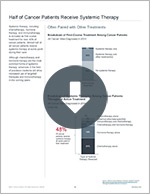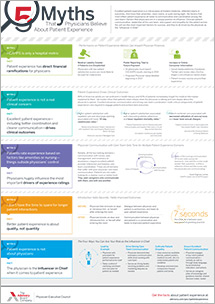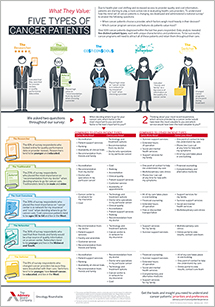Auto logout in seconds.
Continue LogoutFor nine years, Amanda Kabbabe experienced a mysterious pain in her abdomen. During that time, she visited three primary care doctors and four gynecologists, several of whom suggested her pain would go away with dietary changes, before she was correctly diagnosed with ovarian cancer at age 24.
What they value: Get to know the 5 types of cancer patients
Writing for Cosmopolitan, Kabbabe details her frustration as her problems were "brushed … off" by doctors and the lasting impact her experience has had on her physical and mental health.
Doctors said the answer was in her diet
The pain started when Kabbabe was 15. It appeared at random, with a sensation that "was somewhere between a period cramp and stabbing sensation," Kabbabe recalls.
Even then, Kabbabe "knew something had to be wrong," she writes. Over the next nine years, she "made sure to mention this mysterious pain to three primary-care physicians and four gynecologists."
But whenever she brought her concerns to doctors, "they brushed it off," Kabbabe writes. Typically, doctors would recommend Kabbabe be more attentive to her diet. "Each doctor made me feel like my bloating issues and sudden aches could be solved with lean protein, portion control, and cutting carbs," she writes.
A trip to the ED
In August 2017, Kabbabe, who at the time was 24, was walking on the boardwalk with her boyfriend when she doubled over in pain.
When she mentioned the symptoms to her gynecologist at her scheduled visit the following month, the doctor "shrugged off" Kabbabe's concerns "just like every other time," Kabbabe writes.
She recalls the gynecologist saying, "Some people just need to work a little harder" at dieting. The gynecologist conceded that if Kabbabe was "really that concerned" about the pain, she could do an ultrasound. However, Kabbabe writes, "Her dismissive tone made me feel like the expensive procedure would be a waste. So I let it go."
But over the next few weeks, Kabbabe's pain worsened: "My whole body was radiating with cramplike pain," she writes, adding occasionally the pain was so severe she "couldn't get out of bed." She also began experiencing an "unquenchable" thirst, but she "constantly felt full."
She figured her symptoms were caused by stress at work and decided they would eventually pass.
But they didn't.
At the end of October 2017, Kabbabe's pain was so severe she had to miss work, and she went to an urgent care center. During her exam, a doctor touched her abdomen and Kabbabe recoiled in pain. The doctors recommended an immediate MRI leading the doctor to recommend Kabbabe get an MRI immediately.
But an ED doctor ordered a vaginal ultrasound instead "to save money and time," Kabbabe writes. After a few hours, the ED doctor told Kabbabe that she had a common cyst that would go away on its own and prescribed her Tylenol.
But the next day, Kabbabe received a fateful call: The ED doctor called and said he'd misread the scan, and that the cyst was almost 10 centimeters in diameter. "Anything of this size is worrisome for cancer," he said, recommending that she make an appointment with her gynecologist as soon as possible.
Kabbabe got an appointment that same day, but regular doctor was away and she was seen by a nurse practitioner who "suggested it might be an operable dermoid cyst, a benign mass that starts growing at birth," Kabbabe writes.
With cancer at the forefront of her mind, Kabbabe sought a second opinion, but that doctor also told her there was no need to worry, even though Kabbabe's blood had slightly elevated levels of a cancer antigen.
Three days later, when Kabbabe went in for surgery for what they thought was a cyst the gynecologist called her and told her he'd cancelled her surgery, as her blood tests revealed "alarmingly high levels of the protein AFP and the enzyme LDH, which signaled that the mass was actually a cancerous tumor," Kabbabe writes.
A final diagnosis
Kabbabe went to Memorial Sloan Kettering Cancer Center to meet an oncologist who reviewed her tests and informed her that she had a malignant ovarian germ-cell tumor—an extremely rare cancerous tumor that only occurs in 2% of ovarian cancers. The doctor could not determine how long the tumor had been growing—for years or for a few months.
The oncologist informed Kabbabe that her pain had likely been getting worse as the tumor grew and "weighed down [her] right ovary like an anchor, causing it to twist." The oncologist said the cancer was curable, but the mass needed to be removed as soon as possible.
On Nov. 2, 2017, Kabbabe's tumor, right ovary, and right fallopian tube were removed at Sloan Kettering. Kabbabe spent five days in the hospital.
A week and a half after the surgery, Kabbabe's pathology report came back, and she was told her cancer was Stage 1A, which meant it hadn't spread beyond her ovary, but it was grade 3, which meant if it did spread, it would spread quickly.
Kabbabe underwent three cycles of aggressive intravenous chemotherapy to ensure the cancerous cells were gone, and today is officially in remission.
'I was shocked that none of my doctors had caught this'
Reflecting on her experience, Kabbabe writes, "I was shocked that none of my doctors had caught this. The tumor was giant, and my gynecologist never even bothered to touch my stomach when I complained of pain."
After her surgery, Kabbabe sent a letter to her former gynecologist explaining what happened once she switched doctors. "I told her that my tumor was, despite what her team told me, 100% cancerous and suggested they work on their bedside manner." The doctor replied, but did not apologize. The gynecologist ended the letter by saying, "I wish you all the best," Kabbabe writes.
This experience had not only taken a physical toll on Kabbabe, but a significant mental one as well. "I'll never be able to brush off a random ache without fearing it's more cancer that my doctors won't catch," she writes.
"At the end of the day, I tell myself that I've done everything in my power to have my own back," Kabbabe writes. "No patronizing or dismissive doctor can take that away from me" (Kabbabe, Cosmopolitan, 3/11).
What they value: Get to know the 5 types of cancer patients
Cancer patients have more choices for their care than ever before. To attract patients in this fiercely competitive landscape, you must invest your limited resources in the right services—ones that will earn patients' trust and improve their experience.
Our infographic is your guide to understanding the five types of patients and what they value in a cancer provider.
Don't miss out on the latest Advisory Board insights
Create your free account to access 1 resource, including the latest research and webinars.
Want access without creating an account?
You have 1 free members-only resource remaining this month.
1 free members-only resources remaining
1 free members-only resources remaining
You've reached your limit of free insights
Become a member to access all of Advisory Board's resources, events, and experts
Never miss out on the latest innovative health care content tailored to you.
Benefits include:
You've reached your limit of free insights
Become a member to access all of Advisory Board's resources, events, and experts
Never miss out on the latest innovative health care content tailored to you.
Benefits include:
This content is available through your Curated Research partnership with Advisory Board. Click on ‘view this resource’ to read the full piece
Email ask@advisory.com to learn more
Click on ‘Become a Member’ to learn about the benefits of a Full-Access partnership with Advisory Board
Never miss out on the latest innovative health care content tailored to you.
Benefits Include:
This is for members only. Learn more.
Click on ‘Become a Member’ to learn about the benefits of a Full-Access partnership with Advisory Board
Never miss out on the latest innovative health care content tailored to you.



